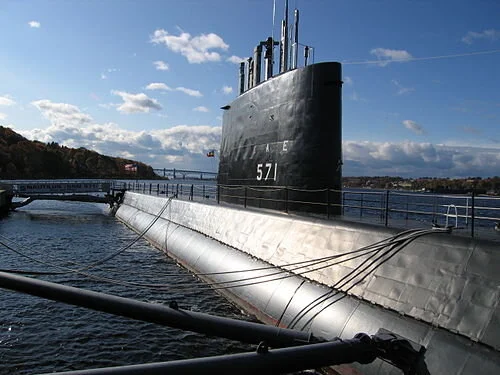
Chris Powell: Do we need these subs for anything but jobs?
USS Nautilus moored in Groton at the Submarine Force Museum
MANCHESTER, Conn.
Since it's not considered sensible to ask the barber if you need a haircut, how is it any more sensible to ask members of Congress from Connecticut if the country needs more attack and ballistic-missile submarines when many are made at Electric Boat in Groton?
Many years ago it was sometimes possible to find a member of Congress from Connecticut who opposed, at least nominally, one stupid imperial war or another, as long as ending the war would not reduce military contracting in the state. But not today. While all the members of Connecticut's congressional delegation are liberal Democrats, each seems indifferent to the prospect of another 20 years of war in Afghanistan, though most Connecticut residents might not be able to find the country on a map.
The big achievement of Joe Courtney's seven terms in the U.S. House from Connecticut's 2nd District, which includes Groton, has been his persuading the federal government to build two attack submarines a year. Courtney has been extremely conscientious about this. He got on the House Armed Services Committee and eventually obtained the chairmanship of its subcommittee on sea power, and he is expert in all the rationales for the United States to fill the oceans with subs built at EB.
The other day Courtney induced the navy secretary to visit the EB shipyard, in part to evaluate whether the company has the capacity to keep building two attack subs each year while starting to build the new generation of missile submarines, the current generation being 30 years old and replacing it having higher priority with the Defense Department than producing a second attack sub every year.
The military rationale for all these submarines might be more persuasive if the state's congressmen weren't also so easily persuaded to sustain the endless war in Afghanistan.
It also might be more persuasive if the federal government hadn't recently concluded amid the virus epidemic that money is infinite and so can be created out of nothing forever as a claim against not only this country's production but the whole world's as well, and without ever wrecking the currency and whatever is left of the market economy.
Not that Connecticut has much interest in the military rationale for the submarines -- or for the jet engines, helicopters, and other weapons of war manufactured in the state. In his official biography, Courtney himself ignores the military rationale for more subs, concentrating instead on the jobs they sustain in his district.
Connecticut might consider Courtney a hero even if he had persuaded the federal government to award EB the same value of contracts to make not submarines but obsolescences like typewriters and video-cassette recorders, which, after all, dropped from B-52s high above Afghanistan, might be more effective against the religious crazies below than any tactics now being used by U.S. forces there.
Of course Courtney and his colleagues in the Connecticut delegation might face some plausible competition for re-election if they ever questioned the military rationale for the products requisitioned here by the Defense Department. Can anyone elected on a state or district level dare to pursue a national interest above a local or special interest? Certainly not if his constituents cannot themselves distinguish between those interests.
Thus big government erodes the principles of nearly everyone in office if it doesn't make them hypocrites. Thirty years ago no one observing Courtney's work as a liberal state representative chairing the General Assembly's Human Services Committee would have guessed that he would go down in history for building the deadliest warships. But even liberal Democrats in Connecticut must serve the military-industrial complex above all, just as conservatives in the Midwest must pledge allegiance to farm subsidies, and politicians of every inclination must propitiate most of what's big enough -- if not the investment banks, then the government employee unions. Some manage to serve both the banks and the unions.
Does anybody in politics really believe in a public interest, believe in anything besides whatever favors his own advancement? And if anybody really did believe in a public interest and expressed some original thought and independence about it, would anyone vote for him?
Chris Powell is a columnist for the Journal Inquirer, in Manchester.

